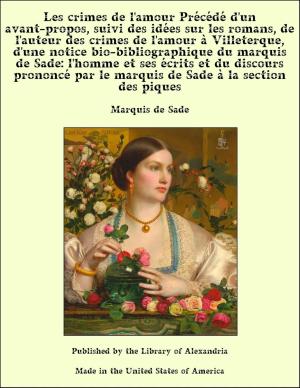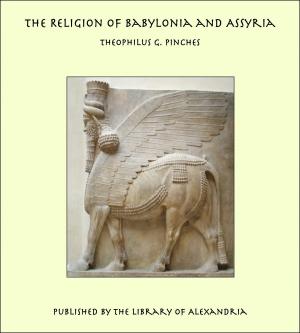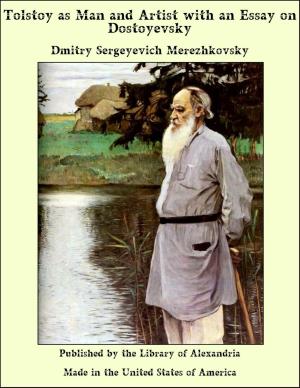| Author: | Robert Smythe Hichens | ISBN: | 9781465551160 |
| Publisher: | Library of Alexandria | Publication: | March 8, 2015 |
| Imprint: | Language: | English |
| Author: | Robert Smythe Hichens |
| ISBN: | 9781465551160 |
| Publisher: | Library of Alexandria |
| Publication: | March 8, 2015 |
| Imprint: | |
| Language: | English |
Doctor Meyer Isaacson had got on as only a modern Jew whose home is London can get on, with a rapidity that was alarming. He seemed to have arrived as a bullet arrives in a body. He was not in the heart of success, and lo! he was in the heart of success. And no one had marked his journey. Suddenly every one was speaking of him—was talking of the cures he had made, was advising every one else to go to him. For some mysterious reason his name—a name not easily to be forgotten once it had been heard—began to pervade the conversations that were held in the smart drawing-rooms of London. Women who were well, but had not seen him, abruptly became sufficiently unwell to need a consultation. "Where does he live? In Harley Street, I suppose?" was a constant question. But he did not live in Harley Street. He was not the man to lose himself in an avenue of brass plates of fellow practitioners. "Cleveland Square, St. James's," was the startling reply; and his house was detached, if you please, and marvellously furnished. The winged legend flew that he was rich, and that he had gone into practice as a doctor merely because he was intellectually interested in disease. His gift for diagnosis was so remarkable that he was morally forced to exercise it. And he had a greedy passion for studying humanity. And who has such opportunities for the study of humanity as the doctor and the priest? Patients who had been to him spoke enthusiastically of his observant eyes. His personality always made a great impression. "There's no one just like him," was a frequent comment upon Doctor Meyer Isaacson. And that phrase is a high compliment upon the lips of London, the city of parrots and of monkeys. His age was debated, and so was his origin. Most people thought he was "about forty"; a very safe age, young enough to allow of almost unlimited expectation, old enough to make results achieved not quite unnatural, though possibly startling. Yes, he must be "about forty." And his origin? "Meyer" suggested Germany. As to "Isaacson," it allowed the ardent imagination free play over denationalized Israel. Someone said that he "looked as if he came from the East," to which a cynic made answer, "The East End." There was, perhaps, a hint of both in the Doctor of Cleveland Square. Certain it is that in the course of a walk down Brick Lane, or the adjacent thoroughfares, one will encounter men of his type; men of middle height, of slight build, with thick, close-growing hair strongly curling, boldly curving lips, large nostrils, prominent cheek-bones, dark eyes almost fiercely shining; men who are startlingly un-English. Doctor Meyer Isaacson was like these men. Yet he possessed something which set him apart from them. He looked intensely vital—almost unnaturally vital—when he was surrounded by English people, but he did not look fierce and hungry. One could conceive of him doing something bizarre, but one could not conceive of him doing anything low. There was sometimes a light in his eyes which suggested a moral distinction rarely to be found in those who dwell in and about Brick Lane. His slight, nervous hands, dark in colour, recalled the hands of high-bred Egyptians. Like so many of his nation, he was by nature artistic. An instinctive love of what was best in the creations of man ran in his veins with his blood. He cared for beautiful things, and he knew what things were beautiful and what were not. The second-rate never made any appeal to him. The first-rate found in him a welcoming enthusiast. He never wearied of looking at fine pictures, at noble statues, at bronzes, at old jewelled glass, at delicate carvings, at perfect jewels. He was genuinely moved by great architecture. And to music he was almost fanatically devoted, as are many Jews. It has been said of the Jew that he is nearly always possessed of a streak of femininity, not effeminacy. In Doctor Meyer Isaacson this streak certainly existed. His intuitions were feminine in their quickness, his sympathies and his antipathies almost feminine in their ardour. He understood women instinctively, as generally only other women understand them. Often he knew, without knowing why he knew. Such knowledge of women is, perhaps fortunately, rare in men. Where most men stumble in the dark, Doctor Meyer Isaacson walked in the light. He was unmarried
Doctor Meyer Isaacson had got on as only a modern Jew whose home is London can get on, with a rapidity that was alarming. He seemed to have arrived as a bullet arrives in a body. He was not in the heart of success, and lo! he was in the heart of success. And no one had marked his journey. Suddenly every one was speaking of him—was talking of the cures he had made, was advising every one else to go to him. For some mysterious reason his name—a name not easily to be forgotten once it had been heard—began to pervade the conversations that were held in the smart drawing-rooms of London. Women who were well, but had not seen him, abruptly became sufficiently unwell to need a consultation. "Where does he live? In Harley Street, I suppose?" was a constant question. But he did not live in Harley Street. He was not the man to lose himself in an avenue of brass plates of fellow practitioners. "Cleveland Square, St. James's," was the startling reply; and his house was detached, if you please, and marvellously furnished. The winged legend flew that he was rich, and that he had gone into practice as a doctor merely because he was intellectually interested in disease. His gift for diagnosis was so remarkable that he was morally forced to exercise it. And he had a greedy passion for studying humanity. And who has such opportunities for the study of humanity as the doctor and the priest? Patients who had been to him spoke enthusiastically of his observant eyes. His personality always made a great impression. "There's no one just like him," was a frequent comment upon Doctor Meyer Isaacson. And that phrase is a high compliment upon the lips of London, the city of parrots and of monkeys. His age was debated, and so was his origin. Most people thought he was "about forty"; a very safe age, young enough to allow of almost unlimited expectation, old enough to make results achieved not quite unnatural, though possibly startling. Yes, he must be "about forty." And his origin? "Meyer" suggested Germany. As to "Isaacson," it allowed the ardent imagination free play over denationalized Israel. Someone said that he "looked as if he came from the East," to which a cynic made answer, "The East End." There was, perhaps, a hint of both in the Doctor of Cleveland Square. Certain it is that in the course of a walk down Brick Lane, or the adjacent thoroughfares, one will encounter men of his type; men of middle height, of slight build, with thick, close-growing hair strongly curling, boldly curving lips, large nostrils, prominent cheek-bones, dark eyes almost fiercely shining; men who are startlingly un-English. Doctor Meyer Isaacson was like these men. Yet he possessed something which set him apart from them. He looked intensely vital—almost unnaturally vital—when he was surrounded by English people, but he did not look fierce and hungry. One could conceive of him doing something bizarre, but one could not conceive of him doing anything low. There was sometimes a light in his eyes which suggested a moral distinction rarely to be found in those who dwell in and about Brick Lane. His slight, nervous hands, dark in colour, recalled the hands of high-bred Egyptians. Like so many of his nation, he was by nature artistic. An instinctive love of what was best in the creations of man ran in his veins with his blood. He cared for beautiful things, and he knew what things were beautiful and what were not. The second-rate never made any appeal to him. The first-rate found in him a welcoming enthusiast. He never wearied of looking at fine pictures, at noble statues, at bronzes, at old jewelled glass, at delicate carvings, at perfect jewels. He was genuinely moved by great architecture. And to music he was almost fanatically devoted, as are many Jews. It has been said of the Jew that he is nearly always possessed of a streak of femininity, not effeminacy. In Doctor Meyer Isaacson this streak certainly existed. His intuitions were feminine in their quickness, his sympathies and his antipathies almost feminine in their ardour. He understood women instinctively, as generally only other women understand them. Often he knew, without knowing why he knew. Such knowledge of women is, perhaps fortunately, rare in men. Where most men stumble in the dark, Doctor Meyer Isaacson walked in the light. He was unmarried















